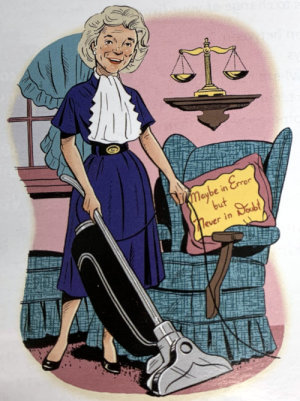Judging Sandra
October 1, 2005

DISCLAIMER: This text has been transcribed automatically and may contain substantial inaccuracies due to the limitations of automatic transcription technology. This transcript is intended only to make the content of this document more easily discoverable and searchable. If you would like to quote the exact text of this document in any piece of work or research, please view the original using the link above and gather your quote directly from the source. The Sandra Day O'Connor Institute does not warrant, represent, or guarantee in any way that the text below is accurate.
Article Text
(Excerpt, Automatically generated)
Judging Sandra
Looking back on a U.S. Supreme Court justice whose ethos uncannily matches that of the 1950s sitcom mom
By Dahlia Lithwick
AS I WRITE, JOHN ROBERTS'S confirmation hearings have begun, and Justice Sandra Day O'Connor remains on the bench, awaiting the nomination of her successor. But imagining her departure, I feel like Dorothy did when she said good-bye to the Scarecrow--that I'll miss her most of all.
It's not just an appreciation for her tart questions at oral argument; or the fumbling of attorney who didn't like such direct questions; or her final, inevitable tense refrain: "Answer the question, counsel."
No, what I'll miss most about Sandra Day is something larger and more ephemeral. I'll miss a whole era I never even knew.
The new hit television show Desperate Housewives has spawned a revival of interest in fifties and sixties stay-at-home TV moms, their values, and their priorities--even though this is an era my generation is too young to remember. Gleaming countertops and the explosive underbelly of the PTA may sound trivial and dated, especially to lawyers. But to me, Justice O'Connor has been an ambassador of that time. Perhaps it's not politically correct to say so, but her values and jurisprudence represent an era that's probably lost forever.
Think for a moment about the archetypal TV mom of the 1950s and 1960s. Beyond the fact that she possessed hair that never moved (and in five years I have never seen O'Connor's budge), what were the identifying
